Organizational Behavior Report: BBC Culture, Power, Politics
VerifiedAdded on 2020/07/22
|16
|4352
|34
Report
AI Summary
This report provides an in-depth analysis of the BBC's organizational behavior, examining the influence of culture, power, and politics on individual behavior and team performance. The report begins by exploring the BBC's historical organizational culture, contrasting it with its current approach, and analyzing the impact of these changes on employee motivation and loyalty. It then delves into various motivational theories, including Maslow's hierarchy of needs and Herzberg's two-factor theory, and their application in enhancing team effectiveness. Furthermore, the report evaluates the role of power and politics within the organization, considering how these elements can either foster or hinder individual contributions and overall business performance. The report also identifies barriers to effective performance and suggests strategies to improve team dynamics and achieve organizational goals, using the BBC as a case study for practical application of theoretical concepts in organizational behavior.
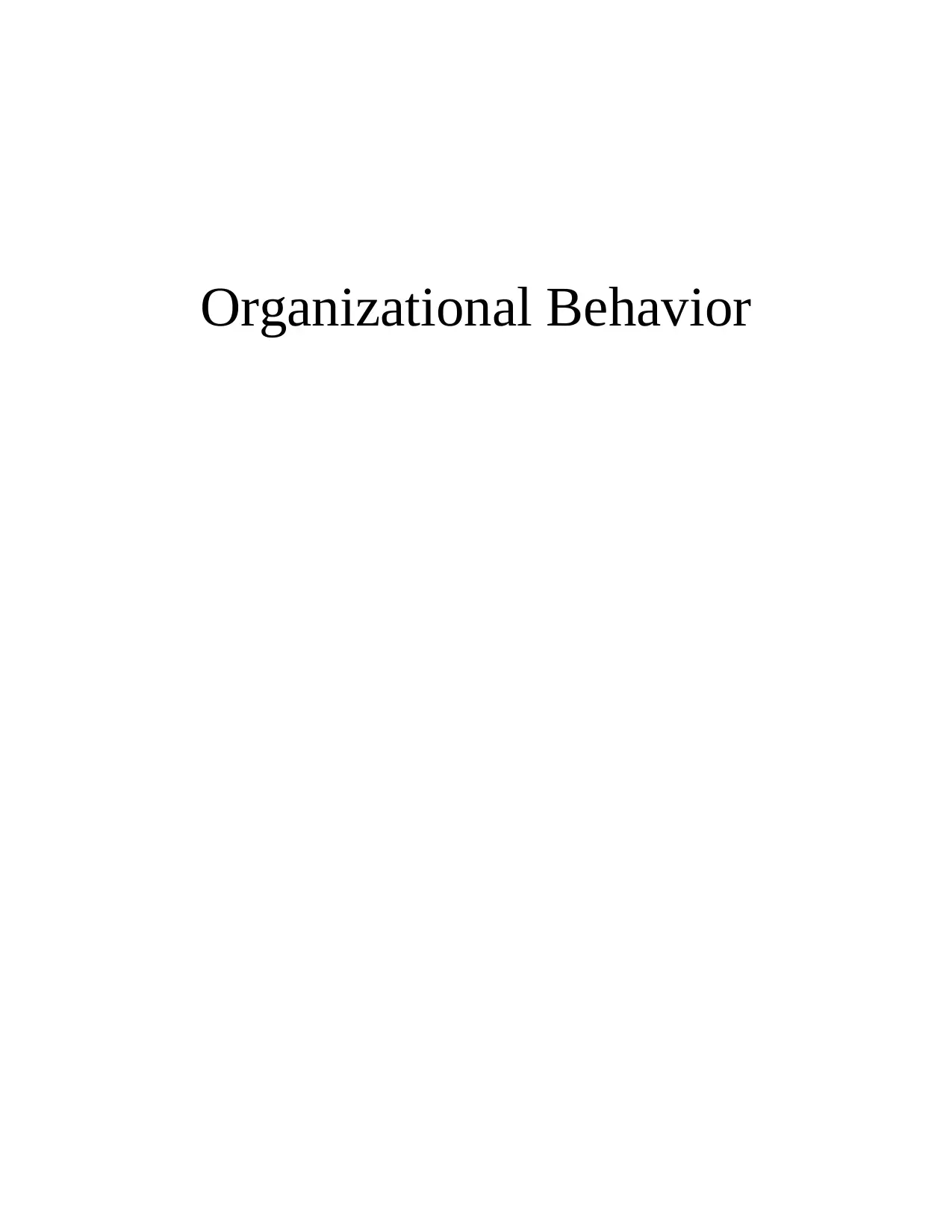
Organizational Behavior
Paraphrase This Document
Need a fresh take? Get an instant paraphrase of this document with our AI Paraphraser
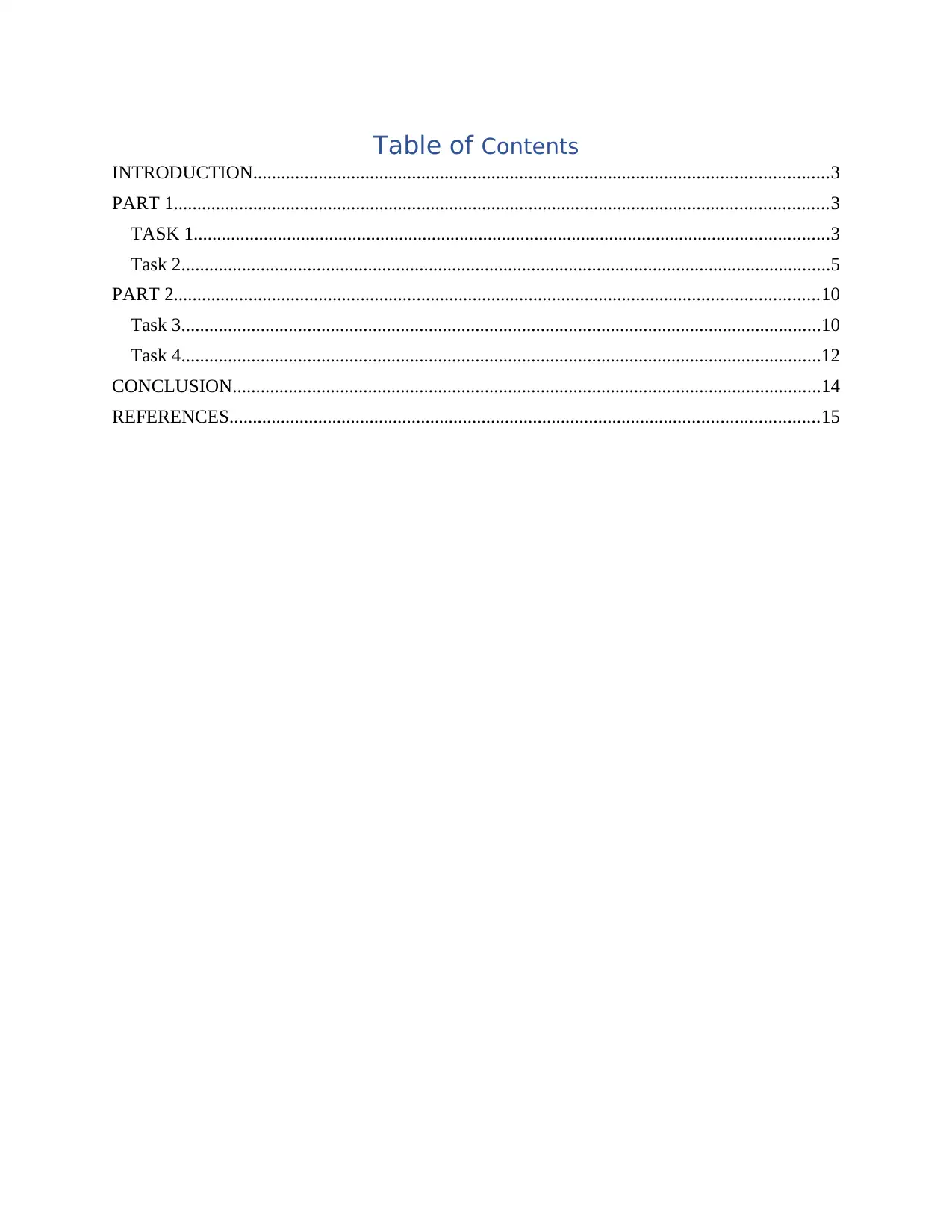
Table of Contents
INTRODUCTION...........................................................................................................................3
PART 1............................................................................................................................................3
TASK 1........................................................................................................................................3
Task 2...........................................................................................................................................5
PART 2..........................................................................................................................................10
Task 3.........................................................................................................................................10
Task 4.........................................................................................................................................12
CONCLUSION..............................................................................................................................14
REFERENCES..............................................................................................................................15
INTRODUCTION...........................................................................................................................3
PART 1............................................................................................................................................3
TASK 1........................................................................................................................................3
Task 2...........................................................................................................................................5
PART 2..........................................................................................................................................10
Task 3.........................................................................................................................................10
Task 4.........................................................................................................................................12
CONCLUSION..............................................................................................................................14
REFERENCES..............................................................................................................................15
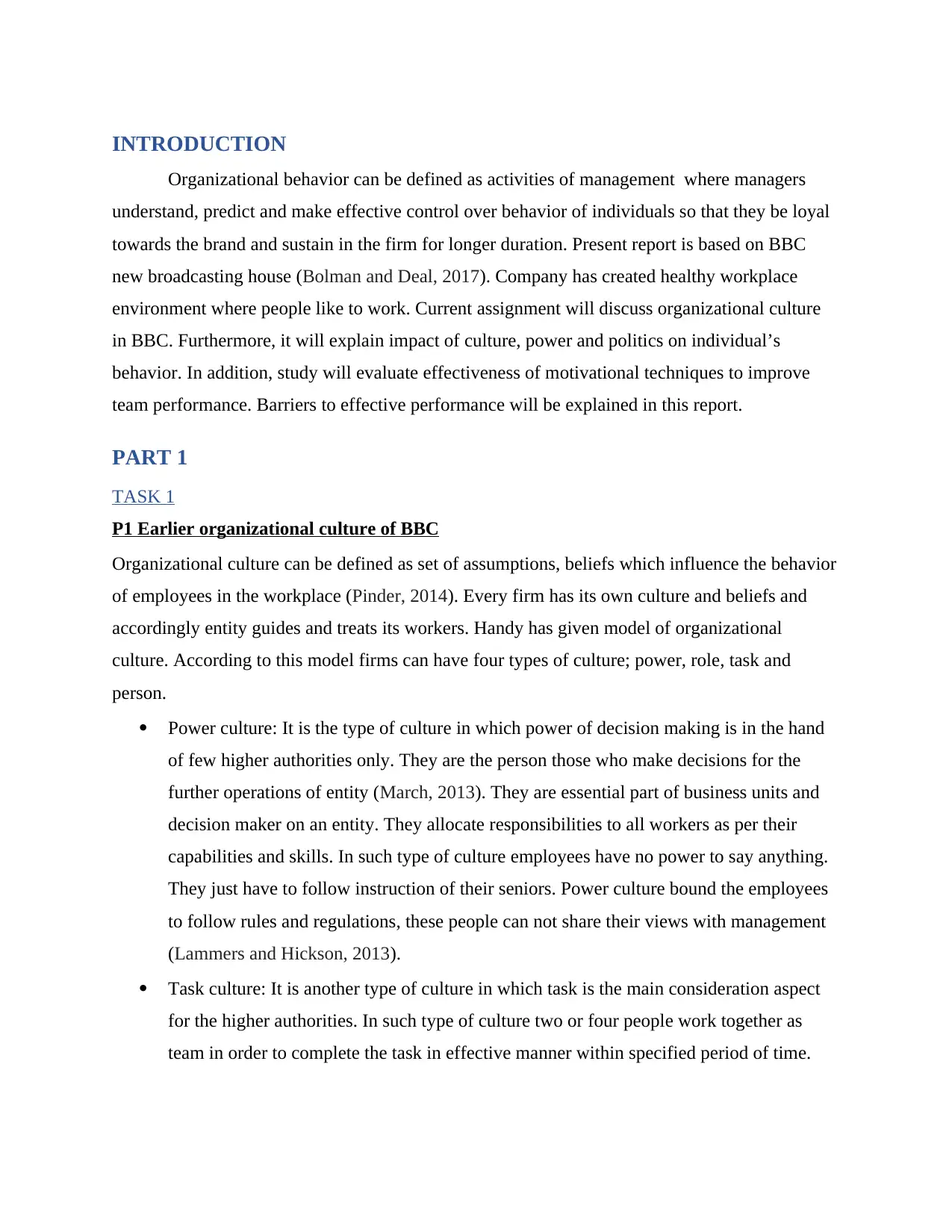
INTRODUCTION
Organizational behavior can be defined as activities of management where managers
understand, predict and make effective control over behavior of individuals so that they be loyal
towards the brand and sustain in the firm for longer duration. Present report is based on BBC
new broadcasting house (Bolman and Deal, 2017). Company has created healthy workplace
environment where people like to work. Current assignment will discuss organizational culture
in BBC. Furthermore, it will explain impact of culture, power and politics on individual’s
behavior. In addition, study will evaluate effectiveness of motivational techniques to improve
team performance. Barriers to effective performance will be explained in this report.
PART 1
TASK 1
P1 Earlier organizational culture of BBC
Organizational culture can be defined as set of assumptions, beliefs which influence the behavior
of employees in the workplace (Pinder, 2014). Every firm has its own culture and beliefs and
accordingly entity guides and treats its workers. Handy has given model of organizational
culture. According to this model firms can have four types of culture; power, role, task and
person.
Power culture: It is the type of culture in which power of decision making is in the hand
of few higher authorities only. They are the person those who make decisions for the
further operations of entity (March, 2013). They are essential part of business units and
decision maker on an entity. They allocate responsibilities to all workers as per their
capabilities and skills. In such type of culture employees have no power to say anything.
They just have to follow instruction of their seniors. Power culture bound the employees
to follow rules and regulations, these people can not share their views with management
(Lammers and Hickson, 2013).
Task culture: It is another type of culture in which task is the main consideration aspect
for the higher authorities. In such type of culture two or four people work together as
team in order to complete the task in effective manner within specified period of time.
Organizational behavior can be defined as activities of management where managers
understand, predict and make effective control over behavior of individuals so that they be loyal
towards the brand and sustain in the firm for longer duration. Present report is based on BBC
new broadcasting house (Bolman and Deal, 2017). Company has created healthy workplace
environment where people like to work. Current assignment will discuss organizational culture
in BBC. Furthermore, it will explain impact of culture, power and politics on individual’s
behavior. In addition, study will evaluate effectiveness of motivational techniques to improve
team performance. Barriers to effective performance will be explained in this report.
PART 1
TASK 1
P1 Earlier organizational culture of BBC
Organizational culture can be defined as set of assumptions, beliefs which influence the behavior
of employees in the workplace (Pinder, 2014). Every firm has its own culture and beliefs and
accordingly entity guides and treats its workers. Handy has given model of organizational
culture. According to this model firms can have four types of culture; power, role, task and
person.
Power culture: It is the type of culture in which power of decision making is in the hand
of few higher authorities only. They are the person those who make decisions for the
further operations of entity (March, 2013). They are essential part of business units and
decision maker on an entity. They allocate responsibilities to all workers as per their
capabilities and skills. In such type of culture employees have no power to say anything.
They just have to follow instruction of their seniors. Power culture bound the employees
to follow rules and regulations, these people can not share their views with management
(Lammers and Hickson, 2013).
Task culture: It is another type of culture in which task is the main consideration aspect
for the higher authorities. In such type of culture two or four people work together as
team in order to complete the task in effective manner within specified period of time.
⊘ This is a preview!⊘
Do you want full access?
Subscribe today to unlock all pages.

Trusted by 1+ million students worldwide
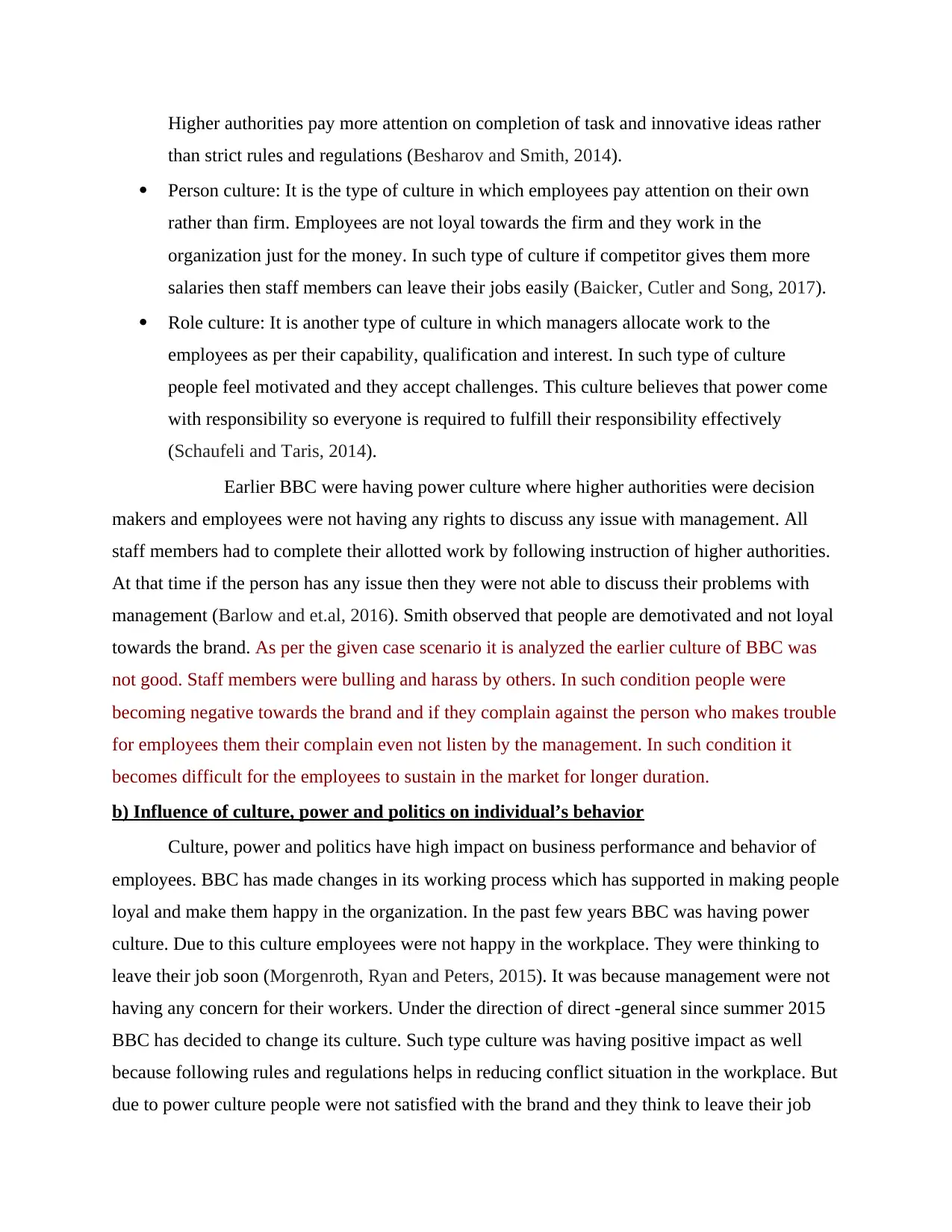
Higher authorities pay more attention on completion of task and innovative ideas rather
than strict rules and regulations (Besharov and Smith, 2014).
Person culture: It is the type of culture in which employees pay attention on their own
rather than firm. Employees are not loyal towards the firm and they work in the
organization just for the money. In such type of culture if competitor gives them more
salaries then staff members can leave their jobs easily (Baicker, Cutler and Song, 2017).
Role culture: It is another type of culture in which managers allocate work to the
employees as per their capability, qualification and interest. In such type of culture
people feel motivated and they accept challenges. This culture believes that power come
with responsibility so everyone is required to fulfill their responsibility effectively
(Schaufeli and Taris, 2014).
Earlier BBC were having power culture where higher authorities were decision
makers and employees were not having any rights to discuss any issue with management. All
staff members had to complete their allotted work by following instruction of higher authorities.
At that time if the person has any issue then they were not able to discuss their problems with
management (Barlow and et.al, 2016). Smith observed that people are demotivated and not loyal
towards the brand. As per the given case scenario it is analyzed the earlier culture of BBC was
not good. Staff members were bulling and harass by others. In such condition people were
becoming negative towards the brand and if they complain against the person who makes trouble
for employees them their complain even not listen by the management. In such condition it
becomes difficult for the employees to sustain in the market for longer duration.
b) Influence of culture, power and politics on individual’s behavior
Culture, power and politics have high impact on business performance and behavior of
employees. BBC has made changes in its working process which has supported in making people
loyal and make them happy in the organization. In the past few years BBC was having power
culture. Due to this culture employees were not happy in the workplace. They were thinking to
leave their job soon (Morgenroth, Ryan and Peters, 2015). It was because management were not
having any concern for their workers. Under the direction of direct -general since summer 2015
BBC has decided to change its culture. Such type culture was having positive impact as well
because following rules and regulations helps in reducing conflict situation in the workplace. But
due to power culture people were not satisfied with the brand and they think to leave their job
than strict rules and regulations (Besharov and Smith, 2014).
Person culture: It is the type of culture in which employees pay attention on their own
rather than firm. Employees are not loyal towards the firm and they work in the
organization just for the money. In such type of culture if competitor gives them more
salaries then staff members can leave their jobs easily (Baicker, Cutler and Song, 2017).
Role culture: It is another type of culture in which managers allocate work to the
employees as per their capability, qualification and interest. In such type of culture
people feel motivated and they accept challenges. This culture believes that power come
with responsibility so everyone is required to fulfill their responsibility effectively
(Schaufeli and Taris, 2014).
Earlier BBC were having power culture where higher authorities were decision
makers and employees were not having any rights to discuss any issue with management. All
staff members had to complete their allotted work by following instruction of higher authorities.
At that time if the person has any issue then they were not able to discuss their problems with
management (Barlow and et.al, 2016). Smith observed that people are demotivated and not loyal
towards the brand. As per the given case scenario it is analyzed the earlier culture of BBC was
not good. Staff members were bulling and harass by others. In such condition people were
becoming negative towards the brand and if they complain against the person who makes trouble
for employees them their complain even not listen by the management. In such condition it
becomes difficult for the employees to sustain in the market for longer duration.
b) Influence of culture, power and politics on individual’s behavior
Culture, power and politics have high impact on business performance and behavior of
employees. BBC has made changes in its working process which has supported in making people
loyal and make them happy in the organization. In the past few years BBC was having power
culture. Due to this culture employees were not happy in the workplace. They were thinking to
leave their job soon (Morgenroth, Ryan and Peters, 2015). It was because management were not
having any concern for their workers. Under the direction of direct -general since summer 2015
BBC has decided to change its culture. Such type culture was having positive impact as well
because following rules and regulations helps in reducing conflict situation in the workplace. But
due to power culture people were not satisfied with the brand and they think to leave their job
Paraphrase This Document
Need a fresh take? Get an instant paraphrase of this document with our AI Paraphraser
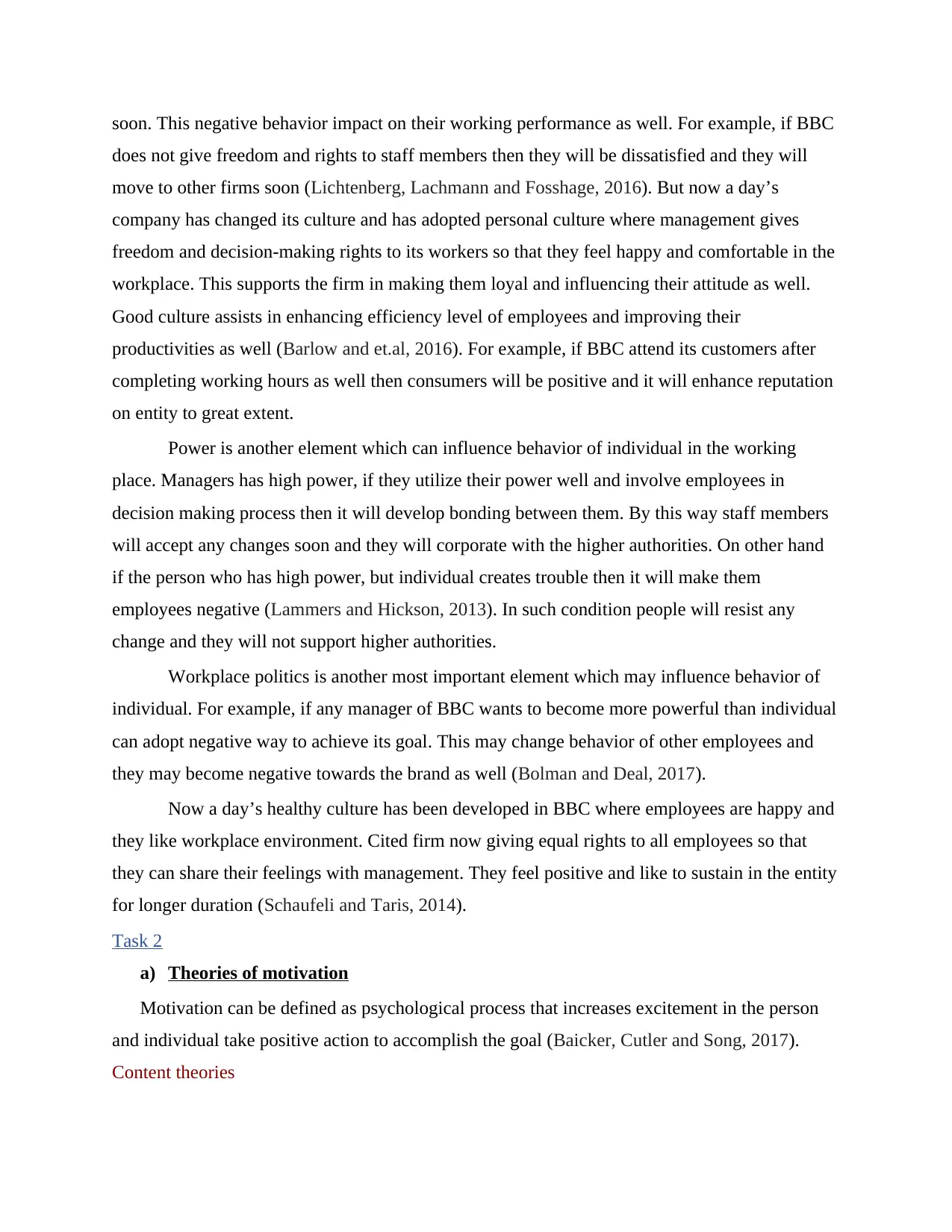
soon. This negative behavior impact on their working performance as well. For example, if BBC
does not give freedom and rights to staff members then they will be dissatisfied and they will
move to other firms soon (Lichtenberg, Lachmann and Fosshage, 2016). But now a day’s
company has changed its culture and has adopted personal culture where management gives
freedom and decision-making rights to its workers so that they feel happy and comfortable in the
workplace. This supports the firm in making them loyal and influencing their attitude as well.
Good culture assists in enhancing efficiency level of employees and improving their
productivities as well (Barlow and et.al, 2016). For example, if BBC attend its customers after
completing working hours as well then consumers will be positive and it will enhance reputation
on entity to great extent.
Power is another element which can influence behavior of individual in the working
place. Managers has high power, if they utilize their power well and involve employees in
decision making process then it will develop bonding between them. By this way staff members
will accept any changes soon and they will corporate with the higher authorities. On other hand
if the person who has high power, but individual creates trouble then it will make them
employees negative (Lammers and Hickson, 2013). In such condition people will resist any
change and they will not support higher authorities.
Workplace politics is another most important element which may influence behavior of
individual. For example, if any manager of BBC wants to become more powerful than individual
can adopt negative way to achieve its goal. This may change behavior of other employees and
they may become negative towards the brand as well (Bolman and Deal, 2017).
Now a day’s healthy culture has been developed in BBC where employees are happy and
they like workplace environment. Cited firm now giving equal rights to all employees so that
they can share their feelings with management. They feel positive and like to sustain in the entity
for longer duration (Schaufeli and Taris, 2014).
Task 2
a) Theories of motivation
Motivation can be defined as psychological process that increases excitement in the person
and individual take positive action to accomplish the goal (Baicker, Cutler and Song, 2017).
Content theories
does not give freedom and rights to staff members then they will be dissatisfied and they will
move to other firms soon (Lichtenberg, Lachmann and Fosshage, 2016). But now a day’s
company has changed its culture and has adopted personal culture where management gives
freedom and decision-making rights to its workers so that they feel happy and comfortable in the
workplace. This supports the firm in making them loyal and influencing their attitude as well.
Good culture assists in enhancing efficiency level of employees and improving their
productivities as well (Barlow and et.al, 2016). For example, if BBC attend its customers after
completing working hours as well then consumers will be positive and it will enhance reputation
on entity to great extent.
Power is another element which can influence behavior of individual in the working
place. Managers has high power, if they utilize their power well and involve employees in
decision making process then it will develop bonding between them. By this way staff members
will accept any changes soon and they will corporate with the higher authorities. On other hand
if the person who has high power, but individual creates trouble then it will make them
employees negative (Lammers and Hickson, 2013). In such condition people will resist any
change and they will not support higher authorities.
Workplace politics is another most important element which may influence behavior of
individual. For example, if any manager of BBC wants to become more powerful than individual
can adopt negative way to achieve its goal. This may change behavior of other employees and
they may become negative towards the brand as well (Bolman and Deal, 2017).
Now a day’s healthy culture has been developed in BBC where employees are happy and
they like workplace environment. Cited firm now giving equal rights to all employees so that
they can share their feelings with management. They feel positive and like to sustain in the entity
for longer duration (Schaufeli and Taris, 2014).
Task 2
a) Theories of motivation
Motivation can be defined as psychological process that increases excitement in the person
and individual take positive action to accomplish the goal (Baicker, Cutler and Song, 2017).
Content theories
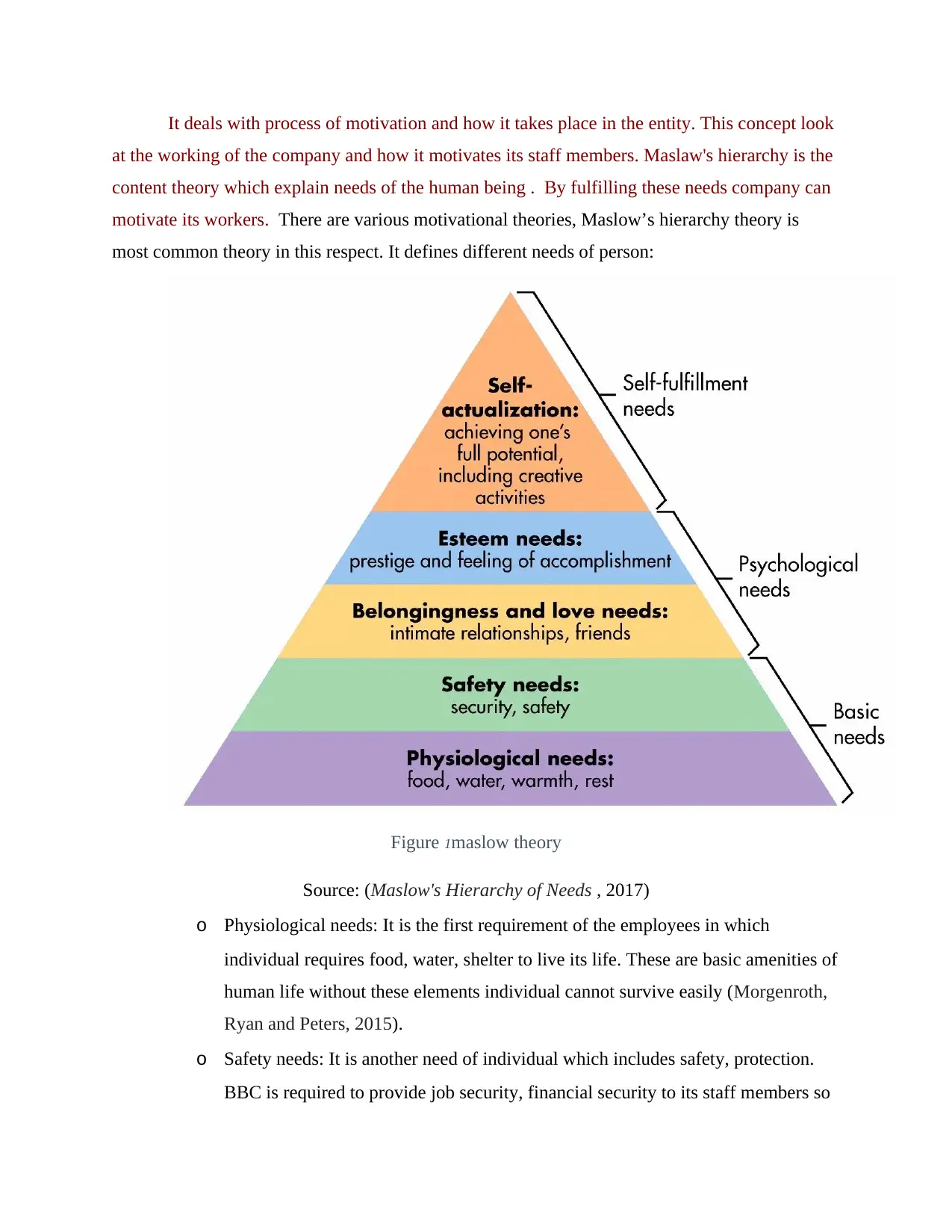
It deals with process of motivation and how it takes place in the entity. This concept look
at the working of the company and how it motivates its staff members. Maslaw's hierarchy is the
content theory which explain needs of the human being . By fulfilling these needs company can
motivate its workers. There are various motivational theories, Maslow’s hierarchy theory is
most common theory in this respect. It defines different needs of person:
Figure 1maslow theory
Source: (Maslow's Hierarchy of Needs , 2017)
o Physiological needs: It is the first requirement of the employees in which
individual requires food, water, shelter to live its life. These are basic amenities of
human life without these elements individual cannot survive easily (Morgenroth,
Ryan and Peters, 2015).
o Safety needs: It is another need of individual which includes safety, protection.
BBC is required to provide job security, financial security to its staff members so
at the working of the company and how it motivates its staff members. Maslaw's hierarchy is the
content theory which explain needs of the human being . By fulfilling these needs company can
motivate its workers. There are various motivational theories, Maslow’s hierarchy theory is
most common theory in this respect. It defines different needs of person:
Figure 1maslow theory
Source: (Maslow's Hierarchy of Needs , 2017)
o Physiological needs: It is the first requirement of the employees in which
individual requires food, water, shelter to live its life. These are basic amenities of
human life without these elements individual cannot survive easily (Morgenroth,
Ryan and Peters, 2015).
o Safety needs: It is another need of individual which includes safety, protection.
BBC is required to provide job security, financial security to its staff members so
⊘ This is a preview!⊘
Do you want full access?
Subscribe today to unlock all pages.

Trusted by 1+ million students worldwide
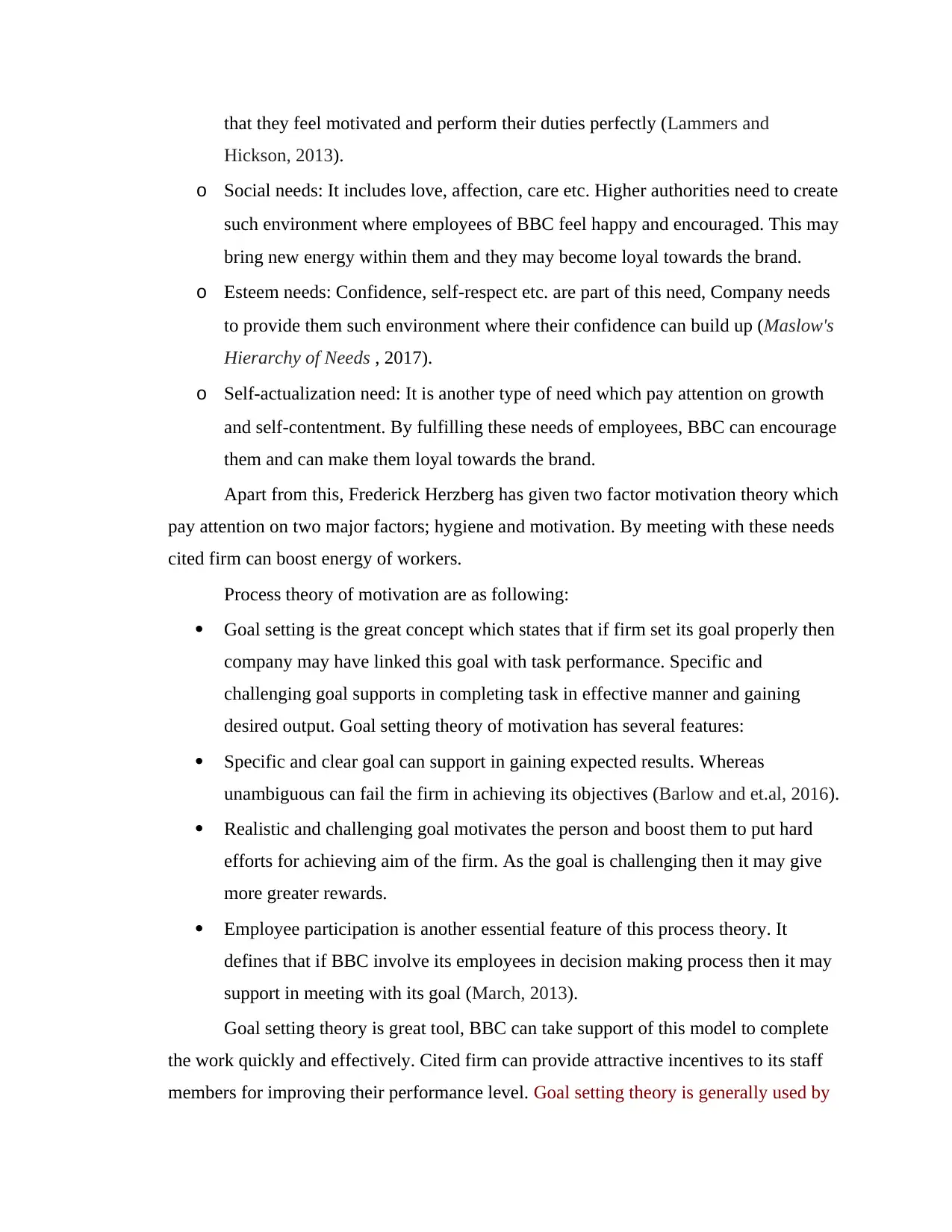
that they feel motivated and perform their duties perfectly (Lammers and
Hickson, 2013).
o Social needs: It includes love, affection, care etc. Higher authorities need to create
such environment where employees of BBC feel happy and encouraged. This may
bring new energy within them and they may become loyal towards the brand.
o Esteem needs: Confidence, self-respect etc. are part of this need, Company needs
to provide them such environment where their confidence can build up (Maslow's
Hierarchy of Needs , 2017).
o Self-actualization need: It is another type of need which pay attention on growth
and self-contentment. By fulfilling these needs of employees, BBC can encourage
them and can make them loyal towards the brand.
Apart from this, Frederick Herzberg has given two factor motivation theory which
pay attention on two major factors; hygiene and motivation. By meeting with these needs
cited firm can boost energy of workers.
Process theory of motivation are as following:
Goal setting is the great concept which states that if firm set its goal properly then
company may have linked this goal with task performance. Specific and
challenging goal supports in completing task in effective manner and gaining
desired output. Goal setting theory of motivation has several features:
Specific and clear goal can support in gaining expected results. Whereas
unambiguous can fail the firm in achieving its objectives (Barlow and et.al, 2016).
Realistic and challenging goal motivates the person and boost them to put hard
efforts for achieving aim of the firm. As the goal is challenging then it may give
more greater rewards.
Employee participation is another essential feature of this process theory. It
defines that if BBC involve its employees in decision making process then it may
support in meeting with its goal (March, 2013).
Goal setting theory is great tool, BBC can take support of this model to complete
the work quickly and effectively. Cited firm can provide attractive incentives to its staff
members for improving their performance level. Goal setting theory is generally used by
Hickson, 2013).
o Social needs: It includes love, affection, care etc. Higher authorities need to create
such environment where employees of BBC feel happy and encouraged. This may
bring new energy within them and they may become loyal towards the brand.
o Esteem needs: Confidence, self-respect etc. are part of this need, Company needs
to provide them such environment where their confidence can build up (Maslow's
Hierarchy of Needs , 2017).
o Self-actualization need: It is another type of need which pay attention on growth
and self-contentment. By fulfilling these needs of employees, BBC can encourage
them and can make them loyal towards the brand.
Apart from this, Frederick Herzberg has given two factor motivation theory which
pay attention on two major factors; hygiene and motivation. By meeting with these needs
cited firm can boost energy of workers.
Process theory of motivation are as following:
Goal setting is the great concept which states that if firm set its goal properly then
company may have linked this goal with task performance. Specific and
challenging goal supports in completing task in effective manner and gaining
desired output. Goal setting theory of motivation has several features:
Specific and clear goal can support in gaining expected results. Whereas
unambiguous can fail the firm in achieving its objectives (Barlow and et.al, 2016).
Realistic and challenging goal motivates the person and boost them to put hard
efforts for achieving aim of the firm. As the goal is challenging then it may give
more greater rewards.
Employee participation is another essential feature of this process theory. It
defines that if BBC involve its employees in decision making process then it may
support in meeting with its goal (March, 2013).
Goal setting theory is great tool, BBC can take support of this model to complete
the work quickly and effectively. Cited firm can provide attractive incentives to its staff
members for improving their performance level. Goal setting theory is generally used by
Paraphrase This Document
Need a fresh take? Get an instant paraphrase of this document with our AI Paraphraser
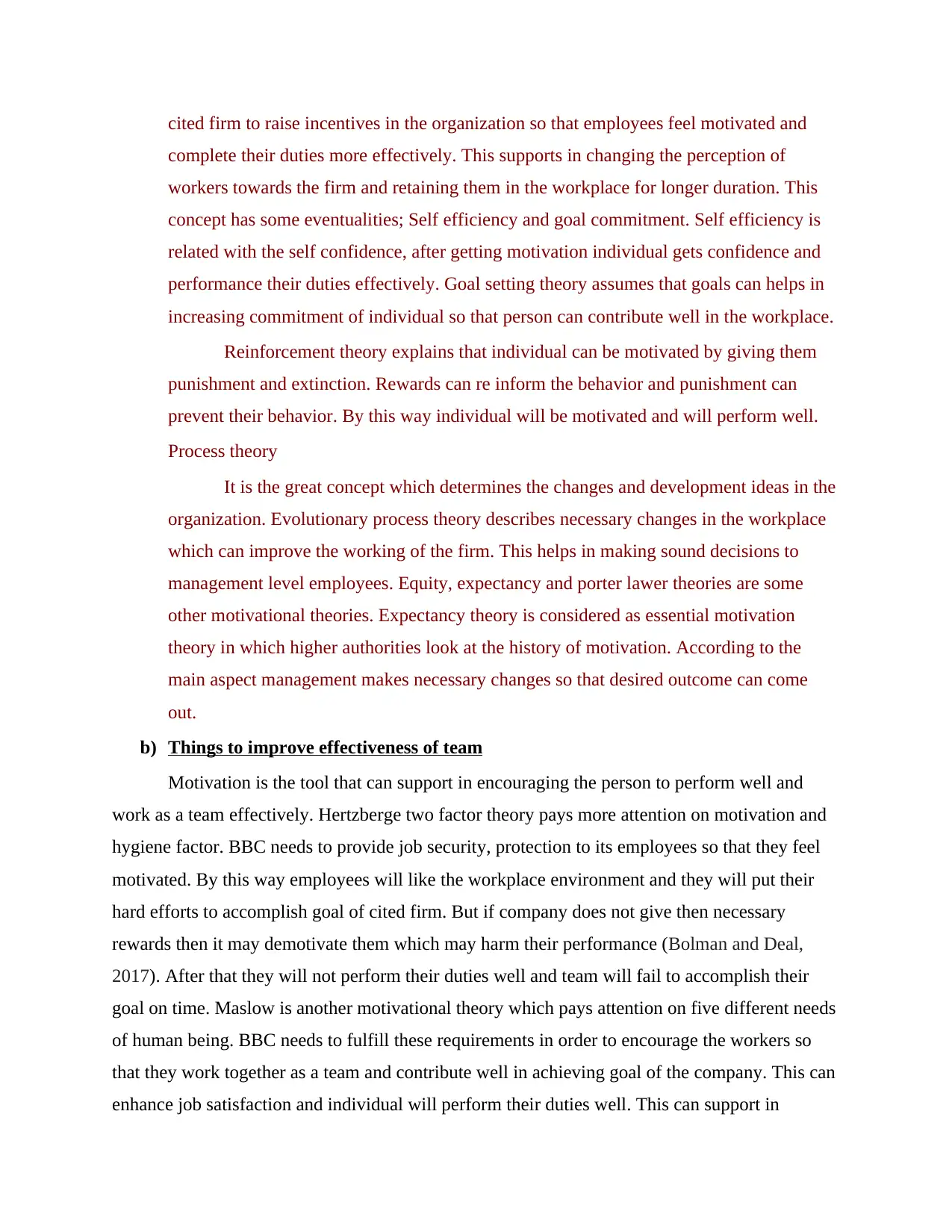
cited firm to raise incentives in the organization so that employees feel motivated and
complete their duties more effectively. This supports in changing the perception of
workers towards the firm and retaining them in the workplace for longer duration. This
concept has some eventualities; Self efficiency and goal commitment. Self efficiency is
related with the self confidence, after getting motivation individual gets confidence and
performance their duties effectively. Goal setting theory assumes that goals can helps in
increasing commitment of individual so that person can contribute well in the workplace.
Reinforcement theory explains that individual can be motivated by giving them
punishment and extinction. Rewards can re inform the behavior and punishment can
prevent their behavior. By this way individual will be motivated and will perform well.
Process theory
It is the great concept which determines the changes and development ideas in the
organization. Evolutionary process theory describes necessary changes in the workplace
which can improve the working of the firm. This helps in making sound decisions to
management level employees. Equity, expectancy and porter lawer theories are some
other motivational theories. Expectancy theory is considered as essential motivation
theory in which higher authorities look at the history of motivation. According to the
main aspect management makes necessary changes so that desired outcome can come
out.
b) Things to improve effectiveness of team
Motivation is the tool that can support in encouraging the person to perform well and
work as a team effectively. Hertzberge two factor theory pays more attention on motivation and
hygiene factor. BBC needs to provide job security, protection to its employees so that they feel
motivated. By this way employees will like the workplace environment and they will put their
hard efforts to accomplish goal of cited firm. But if company does not give then necessary
rewards then it may demotivate them which may harm their performance (Bolman and Deal,
2017). After that they will not perform their duties well and team will fail to accomplish their
goal on time. Maslow is another motivational theory which pays attention on five different needs
of human being. BBC needs to fulfill these requirements in order to encourage the workers so
that they work together as a team and contribute well in achieving goal of the company. This can
enhance job satisfaction and individual will perform their duties well. This can support in
complete their duties more effectively. This supports in changing the perception of
workers towards the firm and retaining them in the workplace for longer duration. This
concept has some eventualities; Self efficiency and goal commitment. Self efficiency is
related with the self confidence, after getting motivation individual gets confidence and
performance their duties effectively. Goal setting theory assumes that goals can helps in
increasing commitment of individual so that person can contribute well in the workplace.
Reinforcement theory explains that individual can be motivated by giving them
punishment and extinction. Rewards can re inform the behavior and punishment can
prevent their behavior. By this way individual will be motivated and will perform well.
Process theory
It is the great concept which determines the changes and development ideas in the
organization. Evolutionary process theory describes necessary changes in the workplace
which can improve the working of the firm. This helps in making sound decisions to
management level employees. Equity, expectancy and porter lawer theories are some
other motivational theories. Expectancy theory is considered as essential motivation
theory in which higher authorities look at the history of motivation. According to the
main aspect management makes necessary changes so that desired outcome can come
out.
b) Things to improve effectiveness of team
Motivation is the tool that can support in encouraging the person to perform well and
work as a team effectively. Hertzberge two factor theory pays more attention on motivation and
hygiene factor. BBC needs to provide job security, protection to its employees so that they feel
motivated. By this way employees will like the workplace environment and they will put their
hard efforts to accomplish goal of cited firm. But if company does not give then necessary
rewards then it may demotivate them which may harm their performance (Bolman and Deal,
2017). After that they will not perform their duties well and team will fail to accomplish their
goal on time. Maslow is another motivational theory which pays attention on five different needs
of human being. BBC needs to fulfill these requirements in order to encourage the workers so
that they work together as a team and contribute well in achieving goal of the company. This can
enhance job satisfaction and individual will perform their duties well. This can support in
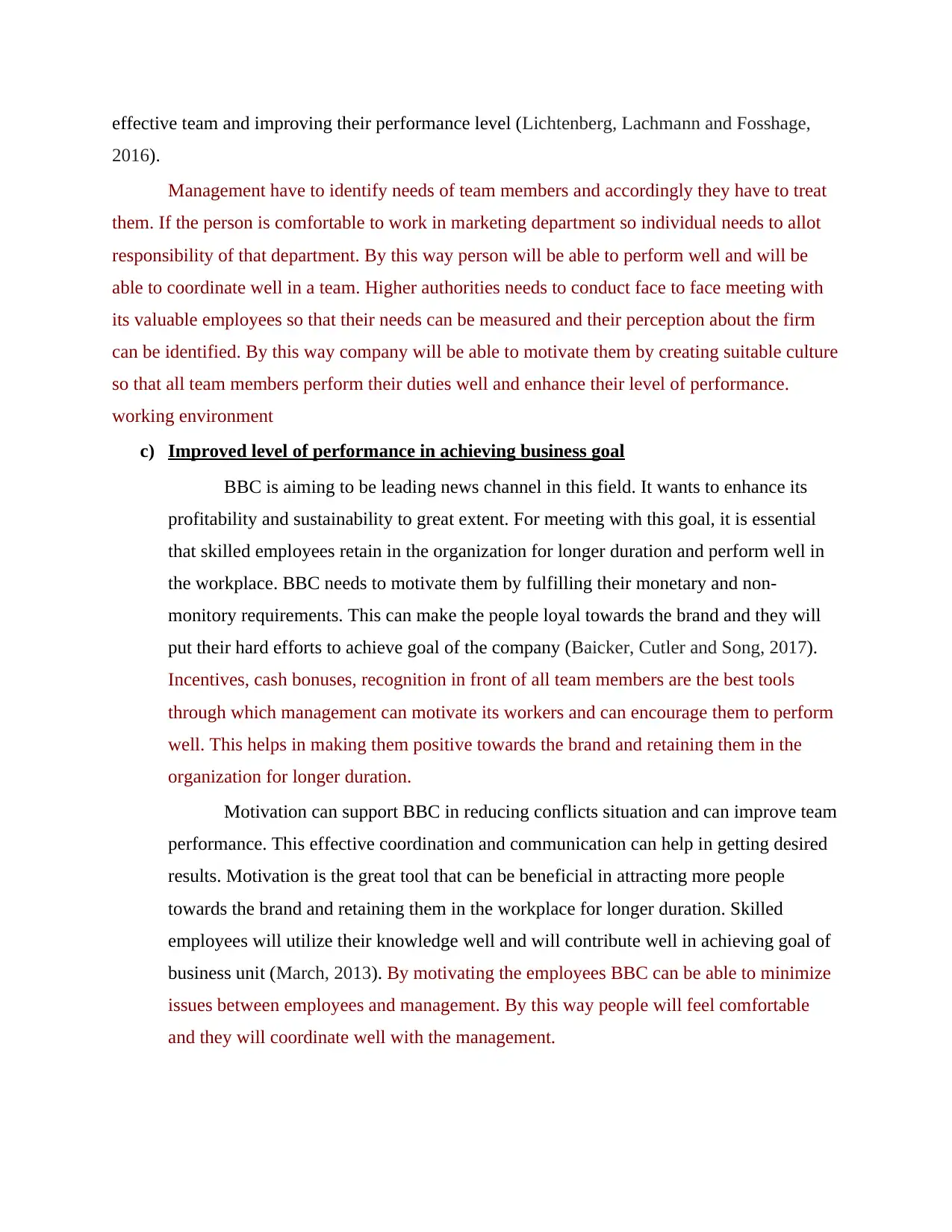
effective team and improving their performance level (Lichtenberg, Lachmann and Fosshage,
2016).
Management have to identify needs of team members and accordingly they have to treat
them. If the person is comfortable to work in marketing department so individual needs to allot
responsibility of that department. By this way person will be able to perform well and will be
able to coordinate well in a team. Higher authorities needs to conduct face to face meeting with
its valuable employees so that their needs can be measured and their perception about the firm
can be identified. By this way company will be able to motivate them by creating suitable culture
so that all team members perform their duties well and enhance their level of performance.
working environment
c) Improved level of performance in achieving business goal
BBC is aiming to be leading news channel in this field. It wants to enhance its
profitability and sustainability to great extent. For meeting with this goal, it is essential
that skilled employees retain in the organization for longer duration and perform well in
the workplace. BBC needs to motivate them by fulfilling their monetary and non-
monitory requirements. This can make the people loyal towards the brand and they will
put their hard efforts to achieve goal of the company (Baicker, Cutler and Song, 2017).
Incentives, cash bonuses, recognition in front of all team members are the best tools
through which management can motivate its workers and can encourage them to perform
well. This helps in making them positive towards the brand and retaining them in the
organization for longer duration.
Motivation can support BBC in reducing conflicts situation and can improve team
performance. This effective coordination and communication can help in getting desired
results. Motivation is the great tool that can be beneficial in attracting more people
towards the brand and retaining them in the workplace for longer duration. Skilled
employees will utilize their knowledge well and will contribute well in achieving goal of
business unit (March, 2013). By motivating the employees BBC can be able to minimize
issues between employees and management. By this way people will feel comfortable
and they will coordinate well with the management.
2016).
Management have to identify needs of team members and accordingly they have to treat
them. If the person is comfortable to work in marketing department so individual needs to allot
responsibility of that department. By this way person will be able to perform well and will be
able to coordinate well in a team. Higher authorities needs to conduct face to face meeting with
its valuable employees so that their needs can be measured and their perception about the firm
can be identified. By this way company will be able to motivate them by creating suitable culture
so that all team members perform their duties well and enhance their level of performance.
working environment
c) Improved level of performance in achieving business goal
BBC is aiming to be leading news channel in this field. It wants to enhance its
profitability and sustainability to great extent. For meeting with this goal, it is essential
that skilled employees retain in the organization for longer duration and perform well in
the workplace. BBC needs to motivate them by fulfilling their monetary and non-
monitory requirements. This can make the people loyal towards the brand and they will
put their hard efforts to achieve goal of the company (Baicker, Cutler and Song, 2017).
Incentives, cash bonuses, recognition in front of all team members are the best tools
through which management can motivate its workers and can encourage them to perform
well. This helps in making them positive towards the brand and retaining them in the
organization for longer duration.
Motivation can support BBC in reducing conflicts situation and can improve team
performance. This effective coordination and communication can help in getting desired
results. Motivation is the great tool that can be beneficial in attracting more people
towards the brand and retaining them in the workplace for longer duration. Skilled
employees will utilize their knowledge well and will contribute well in achieving goal of
business unit (March, 2013). By motivating the employees BBC can be able to minimize
issues between employees and management. By this way people will feel comfortable
and they will coordinate well with the management.
⊘ This is a preview!⊘
Do you want full access?
Subscribe today to unlock all pages.

Trusted by 1+ million students worldwide
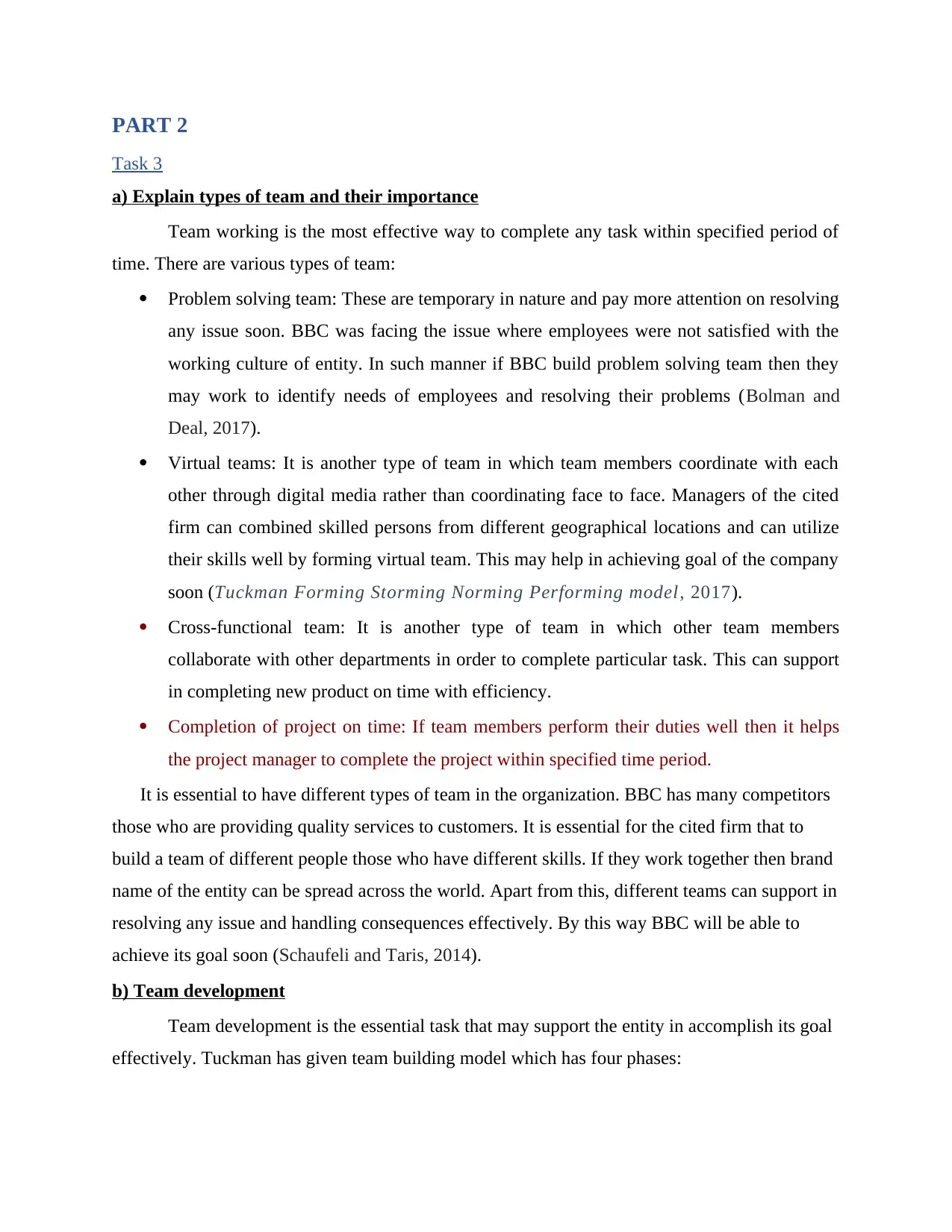
PART 2
Task 3
a) Explain types of team and their importance
Team working is the most effective way to complete any task within specified period of
time. There are various types of team:
Problem solving team: These are temporary in nature and pay more attention on resolving
any issue soon. BBC was facing the issue where employees were not satisfied with the
working culture of entity. In such manner if BBC build problem solving team then they
may work to identify needs of employees and resolving their problems (Bolman and
Deal, 2017).
Virtual teams: It is another type of team in which team members coordinate with each
other through digital media rather than coordinating face to face. Managers of the cited
firm can combined skilled persons from different geographical locations and can utilize
their skills well by forming virtual team. This may help in achieving goal of the company
soon (Tuckman Forming Storming Norming Performing model, 2017).
Cross-functional team: It is another type of team in which other team members
collaborate with other departments in order to complete particular task. This can support
in completing new product on time with efficiency.
Completion of project on time: If team members perform their duties well then it helps
the project manager to complete the project within specified time period.
It is essential to have different types of team in the organization. BBC has many competitors
those who are providing quality services to customers. It is essential for the cited firm that to
build a team of different people those who have different skills. If they work together then brand
name of the entity can be spread across the world. Apart from this, different teams can support in
resolving any issue and handling consequences effectively. By this way BBC will be able to
achieve its goal soon (Schaufeli and Taris, 2014).
b) Team development
Team development is the essential task that may support the entity in accomplish its goal
effectively. Tuckman has given team building model which has four phases:
Task 3
a) Explain types of team and their importance
Team working is the most effective way to complete any task within specified period of
time. There are various types of team:
Problem solving team: These are temporary in nature and pay more attention on resolving
any issue soon. BBC was facing the issue where employees were not satisfied with the
working culture of entity. In such manner if BBC build problem solving team then they
may work to identify needs of employees and resolving their problems (Bolman and
Deal, 2017).
Virtual teams: It is another type of team in which team members coordinate with each
other through digital media rather than coordinating face to face. Managers of the cited
firm can combined skilled persons from different geographical locations and can utilize
their skills well by forming virtual team. This may help in achieving goal of the company
soon (Tuckman Forming Storming Norming Performing model, 2017).
Cross-functional team: It is another type of team in which other team members
collaborate with other departments in order to complete particular task. This can support
in completing new product on time with efficiency.
Completion of project on time: If team members perform their duties well then it helps
the project manager to complete the project within specified time period.
It is essential to have different types of team in the organization. BBC has many competitors
those who are providing quality services to customers. It is essential for the cited firm that to
build a team of different people those who have different skills. If they work together then brand
name of the entity can be spread across the world. Apart from this, different teams can support in
resolving any issue and handling consequences effectively. By this way BBC will be able to
achieve its goal soon (Schaufeli and Taris, 2014).
b) Team development
Team development is the essential task that may support the entity in accomplish its goal
effectively. Tuckman has given team building model which has four phases:
Paraphrase This Document
Need a fresh take? Get an instant paraphrase of this document with our AI Paraphraser
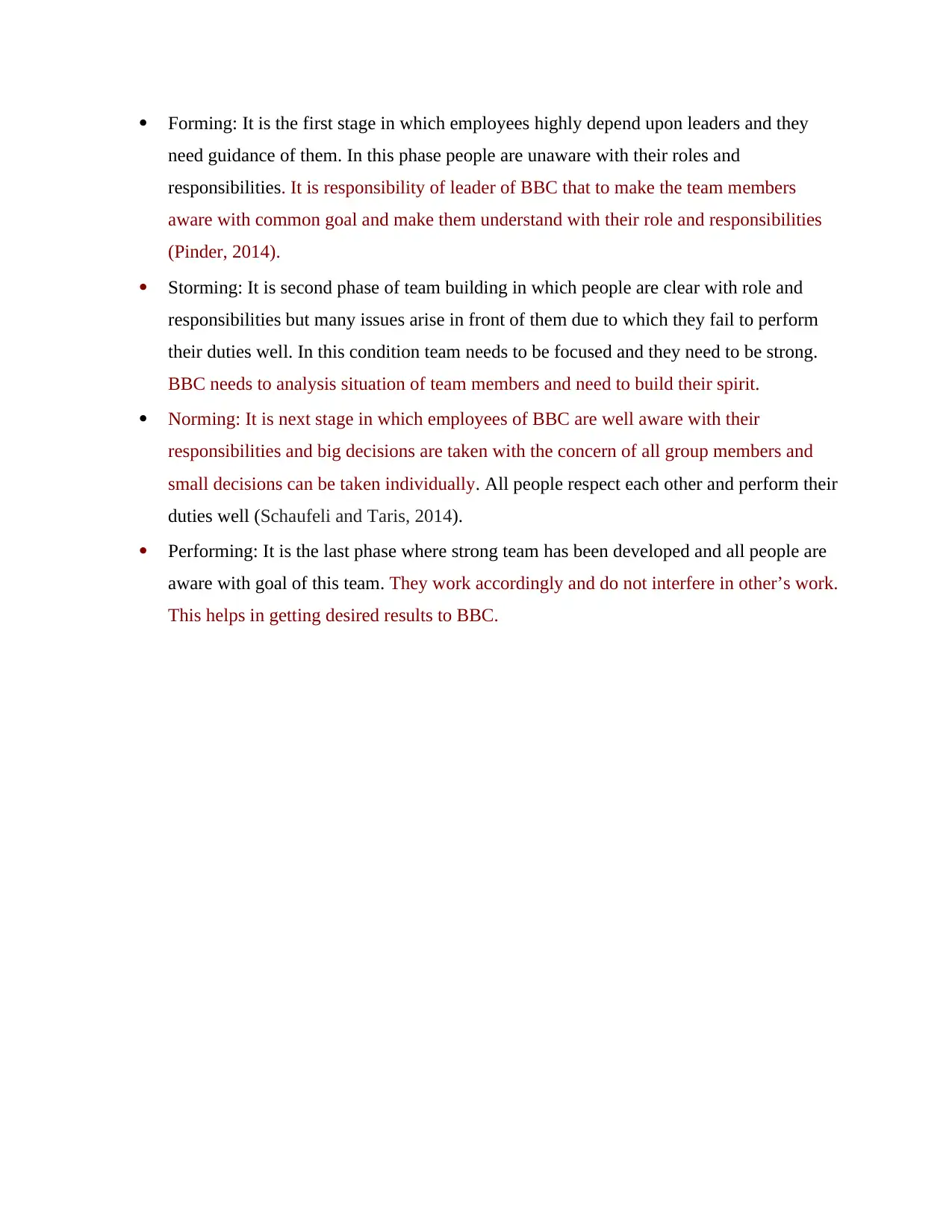
Forming: It is the first stage in which employees highly depend upon leaders and they
need guidance of them. In this phase people are unaware with their roles and
responsibilities. It is responsibility of leader of BBC that to make the team members
aware with common goal and make them understand with their role and responsibilities
(Pinder, 2014).
Storming: It is second phase of team building in which people are clear with role and
responsibilities but many issues arise in front of them due to which they fail to perform
their duties well. In this condition team needs to be focused and they need to be strong.
BBC needs to analysis situation of team members and need to build their spirit.
Norming: It is next stage in which employees of BBC are well aware with their
responsibilities and big decisions are taken with the concern of all group members and
small decisions can be taken individually. All people respect each other and perform their
duties well (Schaufeli and Taris, 2014).
Performing: It is the last phase where strong team has been developed and all people are
aware with goal of this team. They work accordingly and do not interfere in other’s work.
This helps in getting desired results to BBC.
need guidance of them. In this phase people are unaware with their roles and
responsibilities. It is responsibility of leader of BBC that to make the team members
aware with common goal and make them understand with their role and responsibilities
(Pinder, 2014).
Storming: It is second phase of team building in which people are clear with role and
responsibilities but many issues arise in front of them due to which they fail to perform
their duties well. In this condition team needs to be focused and they need to be strong.
BBC needs to analysis situation of team members and need to build their spirit.
Norming: It is next stage in which employees of BBC are well aware with their
responsibilities and big decisions are taken with the concern of all group members and
small decisions can be taken individually. All people respect each other and perform their
duties well (Schaufeli and Taris, 2014).
Performing: It is the last phase where strong team has been developed and all people are
aware with goal of this team. They work accordingly and do not interfere in other’s work.
This helps in getting desired results to BBC.
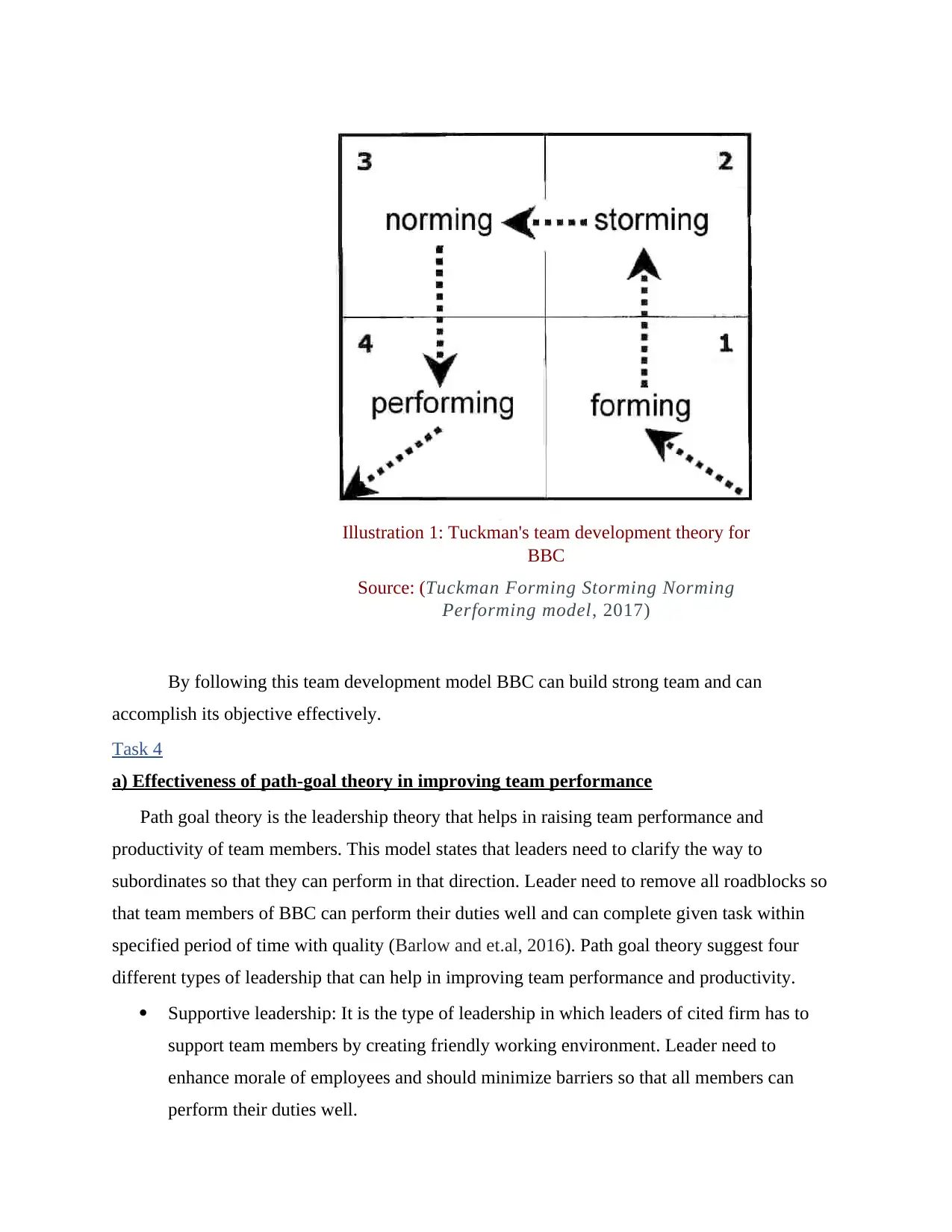
Illustration 1: Tuckman's team development theory for
BBC
Source: (Tuckman Forming Storming Norming
Performing model, 2017)
By following this team development model BBC can build strong team and can
accomplish its objective effectively.
Task 4
a) Effectiveness of path-goal theory in improving team performance
Path goal theory is the leadership theory that helps in raising team performance and
productivity of team members. This model states that leaders need to clarify the way to
subordinates so that they can perform in that direction. Leader need to remove all roadblocks so
that team members of BBC can perform their duties well and can complete given task within
specified period of time with quality (Barlow and et.al, 2016). Path goal theory suggest four
different types of leadership that can help in improving team performance and productivity.
Supportive leadership: It is the type of leadership in which leaders of cited firm has to
support team members by creating friendly working environment. Leader need to
enhance morale of employees and should minimize barriers so that all members can
perform their duties well.
BBC
Source: (Tuckman Forming Storming Norming
Performing model, 2017)
By following this team development model BBC can build strong team and can
accomplish its objective effectively.
Task 4
a) Effectiveness of path-goal theory in improving team performance
Path goal theory is the leadership theory that helps in raising team performance and
productivity of team members. This model states that leaders need to clarify the way to
subordinates so that they can perform in that direction. Leader need to remove all roadblocks so
that team members of BBC can perform their duties well and can complete given task within
specified period of time with quality (Barlow and et.al, 2016). Path goal theory suggest four
different types of leadership that can help in improving team performance and productivity.
Supportive leadership: It is the type of leadership in which leaders of cited firm has to
support team members by creating friendly working environment. Leader need to
enhance morale of employees and should minimize barriers so that all members can
perform their duties well.
⊘ This is a preview!⊘
Do you want full access?
Subscribe today to unlock all pages.

Trusted by 1+ million students worldwide
1 out of 16
Related Documents
Your All-in-One AI-Powered Toolkit for Academic Success.
+13062052269
info@desklib.com
Available 24*7 on WhatsApp / Email
![[object Object]](/_next/static/media/star-bottom.7253800d.svg)
Unlock your academic potential
Copyright © 2020–2025 A2Z Services. All Rights Reserved. Developed and managed by ZUCOL.





